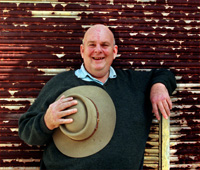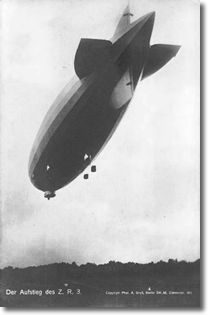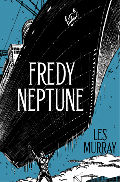|
Fredy Neptune: An Introduction and Overview |
"It is an echo
of the European imperial era to think we have to translate the terms of our dream-life
into the ‘rational’ terms of daylight thinking, with its two aspects of language
and non-verbal design that are said to reflect the two hemispheres of the forebrain. All
other mental faculties, imagination, conscience, intuition, the unconscious mind, are
theoretical and inferred, and may be differently divided up in different cultures, but all
can agree that we dream, and wake, and have a body. We can sense the body’s needs,
its weight, its strength and balance, its health and rhythms and pain; most would agree,
too, that our emotions at least start from there." Fredy Boettcher, a German-Australian sailor in Les Murray's novel in verse, Fredy Neptune, takes us on a half-century-wide journey (ca. 1914-1947), intriguing, seducing, and annoying us with his gift for gab. This narrative voice presents certain rewards and challenges, the chief of which is his compression of language and storyline. Fredy will often shift from place to place in a matter of few stanzas. This gives the text a breathless feel; Fredy is all action and reaction. However, it also demands close attention on the part of readers. Fredy Neptune can be understood, among other things, as a study in theodicy, an epic poem, an episodic, postcolonial novel, and a modern tall tale. [click here for "How Fred and I Wrote Fredy Neptune"] The best way to encounter Fredy Neptune for the first time is to accept Fredy's shifting storyline and read for the central events. The following material is intended to give an introduction to the key themes and overall plotline. The novel, in particular, fluctuates between periods of Fredy's life in exile from Australia and those when he stays home. In all cases, he encounters the "death and killing world" (170). Fredy's journeys away from home can be divided into three major cycles, while the story focuses on two major and one minor period in Australia: |
|
I. 1915-ca.1919 (WWI)--Turkey, Germany, Egypt & Jerusalem [Book 1] |
Turkey & Germany--The contracting of his disease
& its initial consequences Egypt & Jerusalem--His attempts to stay out of the fighting in the British-held Middle East |
Australia [Book 2] |
Fredy's return home and search for his family Meets and eventually weds Laura--2 periods separated by at least 3 yrs. Learns of his son Joe. Works as Fredy Neptune in circus |
II. 1929-ca.1933 (The Depression)--The United States & Germany [Books 3 & 4] |
U.S.--Strong man at St. John's U.S --Life as hobo U.S.--Stint as extra in Hollywood Germany--Meets Sam, Saves Hans |
Australia [end of Book 4--5a] |
Birth and Baptism of daughter, Return to home district and search for father's grace. Hans in institution |
III. 1939-ca.1942 (WWII)-Shanghai & The South Pacific [Book 5b] |
Stint as merchant marine and journey homeward after outbreak of Japanese front |
Australia [Book 5c] |
Work in black market; Rescue of Hans and return of son Joe from the war; Death of mother and friend Sam; Fredy learns to forgive. |
"The larger
the poeme, we may say, the more likely that it has not yet found complete embodiment. The
true god gives you his body: false gods demand yours from you. It is thus always wise to
ask any larger poeme, and some of the smaller ones too: Do you want me as a body for
yourself?" |
|
Book 1--The Middle Sea: In Book 1, Fredy recounts his experiences during WWI. At the beginning of the war, he has a berth on a German freighter, where he is drafted into the German Navy. In Turkey he witnesses the burning of Armenian women, which brings on his leprosy. Due to his disease, he is taken to Berlin, escapes, and eventually makes his way to Egypt. Between Egypt and Jerusalem, he struggles to stay out of the fighting, acts as a calvary stockman for the British forces, is accused of being a spy, narrowly escapes being experimented upon, is on the lame from the military police, meets Lawrence of Arabia, is taken in by an Egyptian family, is courted by a daughter of the house, goes about disguised as a rich Australian, and eventually finds working passage home after four years. |
|
At one point in a car wreck, he discovers his super-human strength when he pulls a car off a woman. While in Jerusalem he receives a message at the Church of the Holy Sepulchre: "If ever you can pray/ with a single heart to be free of it, it will leave you that day" (14).
|
|
Book 2--Barking at the Thunder: Book 2 follows Fredy through various jobs in Australia, each of which he loses because others grow to fear his super-human strength and freedom from pain. Fredy returns home to find that his family is gone, having been forced out due to Australian war prejudice against those of German-descent. He soon discovers that his father is dead, and the police refuse to help him find his mother. While visiting cousins and the war memorials, he meets Laura, the love of his life, He takes work at the steel mill and awkwardly pursues her. He spends his time in the pubs and switches to logging work with a river steamer. He and Laura quarrel and separate; the second time because he tells her the truth about himself. He discovers his mother working as a film pianist. She takes up with a German nationalist and racist. Fredy loses the logging job after performing a miraculous feat, and spends three years fishing. He meets Laura again and discovers that she has born his child; they marry, and eventually take in a black woman and her mixed race child to protect her from the government. Fredy hits a cop during a foreclosure job, and flees, taking work as a Fredy Neptune in the circus. He makes the mistake of moving a car for some gangsters. Sir Peter, a crime boss, who has a deal with the corrupt police, forces Fredy to go to America to kidnap a debtor for him. Along the way, we learn that Fredy regains feeling for a time, but slowly loses it--first in his legs, then arms, etc.
Book 3--Prop Sabres: In Book 3, Fredy recounts his journeys in the United States before and during the Great Depression. The book begins and end with a zeppelin, Fredy seeing one for the first time as he reaches the U.S. and traveling on one as he leaves for Europe. He fails to kidnap Basil Thoroblood from St. John's mansion and ends up joining Basil's stable of strongmen. Basil's wife fails to kill Fredy, even though she stabs him in the back. Fredy recounts for us life at the mansion, including a catalogue of strongmen. Important moments with the strongmen include Sibling's account of an after-death experience, Iowa, a saintly, pacifist's gardening, and Bulba's grief at the Bolshevik killings in the Ukraine. Fredy goes to confession in Louisville and meets Emily in Frankfort, who tells of the loss of her husband in the multi-generational mountain feuds. After the Stock Market collapse, Basil must close down St. John's, which results in the destruction and burning of the mansion by the strongmen. Fredy leaves with Basil, only to have Basil tracked down by mobsters. After picking up a diesel engine off a man, Fredy rides the railcars as a hobo for a time. In Omaha during intense cold, he has a a vision of Iowa, who concludes that "Jesus came to lose" (148). In L.A., he gains employment briefly with a circus, then is hired as an extra in the movies. Along the way he meets Marlene Dietrich, who reads poetry to him and cooks a meal, and Phyllis, who tries to seduce Fredy. Fredy is eventually caught and to be deported. Phyllis miraculously misses being chopped alive by the propellers of a zeppelin, and thus wins a free trip for Fredy and herself to New York.
Book 4--The Police Revolution: Book 4 primarily focuses on Fredy's journey through Nazi-dominated Germany before the outbreak of WWII, though it also includes Fredy's homecoming to Australia and the birth of his daughter. Fredy works his way to Germany in the zeppelin and saves a crewman from falling from the airship. In Munich, Fredy meets his old friend Sam, the Jewish Aboriginal he had meet in Egypt, and together, the two encounter the racial bigotry of the Nazis. While in Germany, he works for the airship, meets his mother again, and loses his job for his nationality. He meets Leila from his circus days, who claims to now be a transvestite, watches a book burning, defends a Jew (which only harms the Jew more), is picked up the S.S., and decides to help Hans, a young man with mental retardation, escape being forcibly sterilized by the regime. He and Hans escape only to be taken in by the Dowager Countess zu Knull. Eventually, he and Hans make their way back to Australia, and Hans is taken in by Fredy's family and befriended by Joe the son. To make ends meet, the family rents their home out and moves into the backlands to live off the land.
Book 5--Lazarus Unstuck: In Book 5, we follow Fredy through WWII, see its impact on his family, and see Fredy come to forgiveness and resolution, becoming "unstuck." Joe is called-up in the infantry, as is Fredy (mistakenly) in the merchant marine. Hans is taken in as a mental patient for his own protection, though he blames Fredy. Laura's mother nearly turns in Fredy as a spy. In Shanghai, Fredy discovers a world of utter corruption. He meets Sam again, who is now working for the Japanese, having escaped from Germany. Sam warns Fredy that Japanese aggression is coming. After Pearl Harbor, the Japanese begin taking all whites in the area. Sam helps Fredy escape with a forged passport. In Manila, Fredy flees with a mixture of people aboard a yacht. The boat is eventually shot by a plane and lands off Kadad Island, where Fredy sees the Japanese massacre Catholic missionaries. After their boat is destroyed by airfire, only Fredy and Ernie barely survive in New Guinea surrounded by fighting with the Japanese. Ernie believes that Fredy must be a spy due to his German heritage, even though Fredy saves his life. Fredy eventually finds work on a freighter and returns to Australia. Fredy goes into black market work to bring home food. He discovers that Hans is being abused in the ward, so Laura works out a plan to forge Hans' papers so that he can take the identity of Fredy's dead brother. Joe returns from the war violently changed, accusing Fredy of being a coward, though after Fredy's mother is killed in the Dresden firebombing, Joe learns to forgive. Fredy begins to feel again after Hiroshima and Nagasaki, but refuses to feel based on others' destruction. He saves Joe's life, but at the cost of real damage to himself. After learning of Sam's suicide, he prays and learns to forgive, truly beginning to feel for the first time since WWI.
|
|
Key Themes "More than any other country I know, the
educated elite in Australia hates the ordinary people. They really do despise them. The
snobbery against non-educated or non-trendy people is ferocious. The characteristic tone
of Australian cultural discourse is scorn, contempt and hatred. It’s a loathsome
society to be in in that way. It’s a frightful imprisonment to be caught in the
Australian intellectual climate."
|
|
|
|


